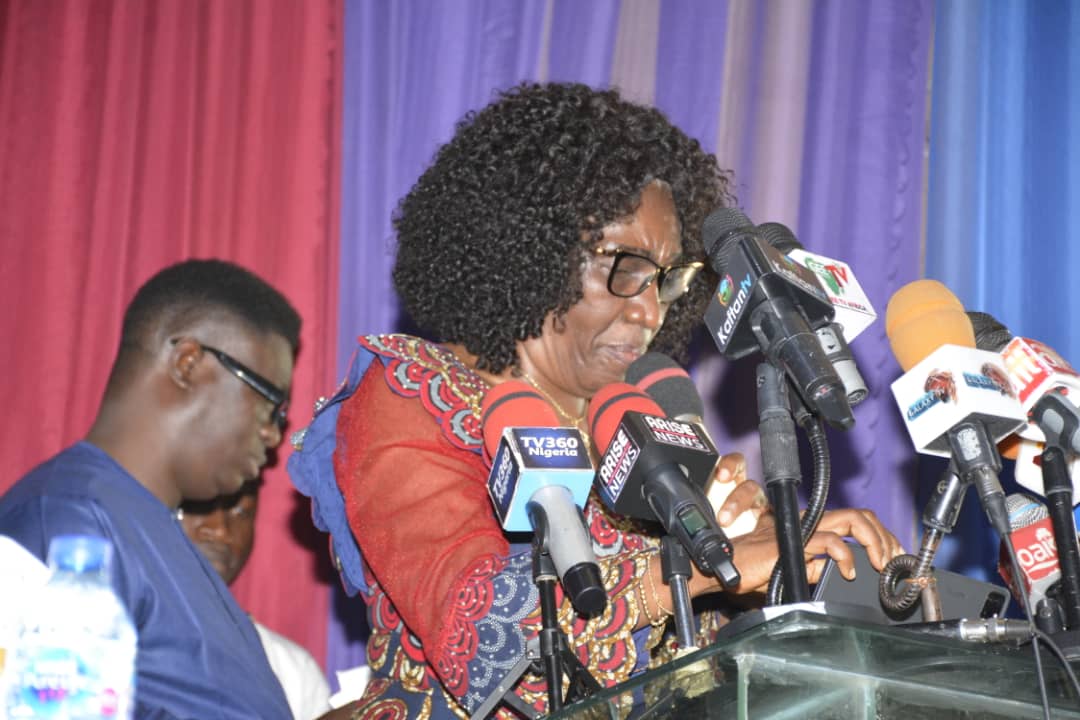-As Bishop lauds FUTO VC
The Vice Chancellor of the Federal University of Technology Owerri, (FUTO), Prof (Mrs) Nnenna N. Oti (JP), has harped on the for education to be made afford able and accessible to youths as a way ending youth restiveness and involvement in insecurity, crime and other vices.
Prof Ottih stated this in a paper she delivered at the National Security summit organized by the National Association of Nigerian Students (NANS) in Abuja yesterday.
Prof Oti in the paper titled, “Education as a tool for ending youth involvement in insecurity” SAID, “I am very excited to be here today. It is with a deep sense of responsibility, mission and total conviction that the greatest asset of Nigeria is not her crude oil and gas wells, fertile agricultural lands, beautiful climate etc. but You! the Young people of this great country. You are Nigeria’s greatest resource and the future of this great country is in your hands.
I therefore, stand on the pedestal of this momentous occasion to appreciate and salute the organizers of this Summit for their vision and thoughtfulness. My interest and excitement revolves around the aptness of the Theme in the light of unfolding security challenges. Students and indeed the youth represent the engine of socio-economic and political progress in any society. As we all know the youths embody strength, stamina, vigor, vitality, exuberance and yes the future
Yet, it is an enchanting and most engaging stage in everyone’s life. In every clime, the youth constitute the beacon of hope, the reservoir of creative and boundless energy and the high grade potentials for national development. The youths, either as students or educated young men and women foreshadow the unfolding future of our country, the totality of our collective dreams and vision, the essence of our national identity and pride. By virtue of the immutable constancy of time and space, the youths are the heirs of the emerging greater Nigeria.
In the frenzy to assert themselves and to upstage the older generation, the youths may over step historical and well-earned ancient boundaries which may in turn undermine the essential fabrics that have served society well and preserved it, ensuring survival and continuity. Youthfulness represents the age of everything-is-possible!: courage, bogus ideas, eutopianism, idealism, wishful thinking and I dare say sometimes, unrealistic expectations!
It is against this backdrop that I will juxtapose the current security challenges in our country with how the youths would overcome the temptations of succumbing to the ploys of purveyors of violence as unwary collaborators. Given the nature of youths as catalysts for action and dynamic social change, they are usually prone to aligning with any group that promotes some populist ideology especially when it purports to alleviate perceived social problems like unemployment, lack of social amenities, infrastructural deficits, hunger and political exclusion or marginalization.
Innocent youths and those who are carried away by religious and ethnic sophism have often been misled to either connive or join forces with groups perpetrating all manner of mayhem against the state. This has over time in our country manifested as insurgency in the North East, banditry in the North west, disturbing separatist agitations in the South east and South west, kidnappings for ransom, herders and farmers clashes and a general climate of insecurity across the land. Credible evidence and objective data clearly indicate that majority of these insurgents and criminal elements are made up of misguided youths (even though their sponsors are usually older adults who should know better!) this scenario captures and typifies the Nigerian conundrum where some segments of unwary youths have embarked on a mindless mission to create fear and panic among the populace.
It is against this background that I will in this paper share some philosophical thoughts that I wish someone taught me when I was young, define some key terms, summarized the evolution of insecurity in Nigeria, delineate the causes of insecurity in our clime, before sharing my thoughts on the way forward using education as a tool for combating the current scourge of insecurity in our land.
3.0 Some Philosophical Thought
Things I Wish I Was Told When I Was Your Age:
Live a purpose/passion driven life.
Your destiny is in your hands.
The only life worth living is a life of service to humanity.
Time is the most important resource you have. Use your time well, don’t waste it. There is nothing called tomorrow, all you have is today.
Those who live for nothing, die for nothing.
Dream big dreams for your life.
If you can think it, you can do it.
The choices you make today, will determine where you will be tomorrow.
The fear of God is the beginning and end of all wisdom.
It is always the right time, to do the right thing.
It is never too late to change!
Everything is achievable.
Make every day count.
Don’t get mad! Get better!!
4.0 Definitions
Who is a Youth: The United Nations (UN), defines the term YOUTH! as persons between the ages of 15 and 25, but quickly acknowledges that its definition as a specific age range varies as youth is not necessarily defined chronologically. In this regard some have used the term to refer to people between 15 to 35 years while yet another school of thought defines it as the state of the mind.
What is Education: A process of receiving or giving systematic instructions especially at a school or university. It is the process of enlightening the mind with qualitative and constructive ideas and thought that uplift the social, cultural and technological standing of man in the society.
What is Insecurity: The word security is derived from a Latin word that “means without concern, fear or anxiety. It follows therefore, that the word insecurity means to live with concern, fear, anxiety and/or chaos. Security is a fundamental need of Man just like food. In its absence, other higher ideals are difficult to attain. For the avoidance of doubt, when I speak of insecurity in this paper I am referring to what Omoroje et al., (2020) have described as the declining state of safety of life and property in the land, apprehension over the increasing rate of terrorism, armed robbery, kidnappings, political upheavals, religious conflicts, assassinations, secret cults-related criminal acts, inter and intra ethnic strife, hijacking, riots and demonstrations to mention just a few.
5.0 The Evolution of Insecurity in Nigeria
In our most recent history, particularly since after the civil war, the most glaring foundation of the current insecurity situation engulfing Nigeria is traceable to the Niger Delta crisis. Beginning in the 1990s as a mild agitation, it snowballed into a formidable and nearly uncontrollable militancy that fully engaged the security agencies including the military for a season, until the negotiated unconditional pardon/Amnesty took hold and calmed the situation.
Vestiges of the Niger Delta crisis, quickly showed up in the South east in the years immediately following as some elements of the militant group in the Niger Delta who refused to surrender their arms poured into the Abia and Imo states, where they resorted to kidnappings as a means of livelihood. This phenomenon shook the entire South east (leading to the mass exodus of investors from the region), almost decimating the commercial/industrial city of Aba.
Following closely at the hills of these South east crises was the flaring up of the simmering age-long Jos crisis sometime between 2007 and 2010. This nagging issue in the Plateau region has on some occasions been attributed to sectarian violence, cultural clashes and land disputes. Whatever the cause, it took its toll on lives and the nations economy and engendered a high sense of insecurity in the land.
Perhaps the most direct effects on our educational system came with the Bokoharam insurgency. Founded in 2002, it unleashed it attack on the Nigerian nation between 2009 and 2021 under the leadership of Abubakar Shekau. Taking cities, communities, and even Local Government areas, they hoisted their flags on the Nigerian soil. It is no more secret that, Bokoharam represents the deadliest and most organized attack on the sovereignty of Nigeria since after the civil war.
According to WIKIPEDIA, the Bokoharam insurgency has resulted in the killing of about 57,333 persons, the displacement of about 2.3 million people from their homes and the abduction of several hundreds of school children beginning with the kidnap of 276 school girls in Chibok, Borno State, Nigeria.
The Bokoharam insurgency has since metastasized into other forms of insecurity namely: rampant and indeterminate herdsmen attacks across the country and banditry, just to mention a few. Whereas the former is making deep incursions into the rainforest regions of Nigeria generating incessant famer-herdsmen clashes, the latter has spread across the country taking hold on the North west, North central and South west zones.
The major outcome of this growing and seemingly uncontrollable security situation is that Nigerians have lost the freedom to live without concern, fear and anxiety. There is tension everywhere and life in our dear country has become short and brutish even as unknown gun men rule over our streets and non-government actors, under the guise of self-determination have taken captive of the entire south east, enforcing an incessant sit-at-home order that is fast crippling the economy of Nigeria. The combined effects of these different shades of insurgencies on the Nigerian landscape is the disabling of government, the curtailment of our freedoms and liberties, the crippling of our educational and economic systems and the enthronement of anarchy in our body politics. So, why have we found ourselves in this embarrassing situation? I list below a few of the facts responsible for the malady.
6.0 The Causes of Insecurity in Nigeria
Several factors are responsible for the development of the sad security situation in Nigeria. Some of them are:
Corruption
Marginalization
Social inequality
Ethnicity
Poverty and greed
Loss of value system
Religious intolerance
Foreign infiltration of insurgents
Bad leadership
Youth unemployment
Porosity of our borders
Falling standards of education
Poor judicial system
Cultism and cult activities
High Value placed on material things
Manipulation of electoral process by politicians
Lack of trust on security agents
Human right abuses
Injustice
Lack of transparency
7.0 The Way Forward
There are no quick-fixes, and they can be no magical solutions to Nigerias numerous problems. The good news is that we have the potential to truly become the giant of Africa and a great country that provides for all of its citizens an enabling environment to succeed and live useful and joyful lives. Below, are some of my humble suggestions:
We need good leaders and good governance at all levels
We need as a matter of great urgency to invest massively at all levels of our educational system, not just universities and other tertiary institutions.
We must diversify our economy, to go beyond oil and gas revenues. We must strengthen our economy, to become net exporters, and not net importers, improve our industrial and manufacturing base. We must create jobs and employment for our young people.
We must develop our agricultural sector which has the potential not only to reduce mass poverty and hunger, but to employ 40-50% of the population,
Government must create enabling environment to attract foreign investors, like Singapore, moving Nigeria from third world to first world is a task that must be done.
We must improve our infrastructure starting with regular supply of electricity.
Our education curriculum should be reversed to emphasize skill acquisition, enterprise development, self-confidence and self-reliance and last on my list,
Stop corruption at all levels. Like China, the penalty for corruption should be life imprisonment or death
The proven way of achieving all this and repositioning Nigeria for greatness is to deliberately weaponries education and strategically and systematically deploy it against our insecurity challenges as a way to recover Nigeria from its current descent into the abyss.
8.0 Education as a tool for Combating Insecurity in Nigeria
In enlisting education as a strategy for combating, degrading and restoring our sense of safety in our communities, the full breath of our educational system must not only be involved, but must also be dusted up and repositioned for effectiveness. This means that attention must be paid to our:
Informal educational system
Formal educational system
Informal Educational System: This refers to those lessons, values and survival skills that are taught in the home, the village setting, on our farmsteads, in the forest, on the river banks and in all other places besides the classroom.
It is in theses informal platforms that we teach our children and young adults in our communities:
The need for modest living as opposed to ostentatious life styles
The need to control family size
The need for economic independence , hard work and self confidence
The need to imbibe core values that lead up to a very high standard of morality, and self-discipline that build character.
The need to interrogate the spiritual and to understand that man achieves a better balance when he or she defers to a higher spiritual being.
The need for skills in self-defense especially the girl child as the foray into the wild to fetch wood, draw water, harvest farm products and perform other chores.
The need for a heightened sense of responsibility for the collective security of the village, the clan, the community or the city. This has been christened community policing today but it had always been part of our survival strategies, as a people.
II. Formal Education System: Whereas informal education takes place on the go and teaching and learning takes place as we do, formal education takes place in classrooms, laboratories, workshops, online etc. The formal educational settings must be made to be all embracing including: vocational, practical and theoretical education. This must be based on well-articulated national goals, well planned curriculum, assessment processes/procedures, quality of teaching staff, quality of student enrolment, and quality of oversight and supervision by the authorities responsible for quality control, process review and continuous refinement of the educational systems with one goal in mind: restoring the integrity and efficiency of the Nigerian Nation through the development of quality human resources who will operate the different facets of the Nigerian project.
From the foregoing we see that of great importance, if Nigeria must move forward, is the leadership question.
9.0 Good Leadership to the Rescue
If there is one issue that everyone literally has a view about it is leadership and leaders. And probably for good reasons – the quality of leadership touches our lives in various ways. The choices public figures make, have implications on every sphere of our lives – personal and community matters – security, municipal services, education, job creation, welfare issues etc. leaders not only mold the world we live in today, but affect the world we leave behind for our children tomorrow.
The Good Leader: Good leaders are made, not born. They have the desire and will power to rise up to the challenges of effective leadership. They are the Nelson Mandela’s, the Nnamdi Azikiwe’s, and the Barak Obama’s of this world. They also include the Maria Theresa’s and the Pope John Paul IIs, who are driven by their great love and passion for humanity, particularly the most vulnerable and disadvantaged groups.
Good leaders provide consistent and reliable moral compass, inspire and motivate followers to higher ideals and uphold core moral values in order to shape public morality.
Harvard Business School 2001 Bulletin identified the following as the most important qualities of good leaders.
Charisma
Communication
Honesty
Vision
Knowledge and passion
Other attributes of good leaders include
Assertiveness
Accountability
Love for people
Discipline, humility, respect
Patience, competence, sound judgment
Restrain and contentment
Selflessness, sacrificial attitude and a giving spirit
A great sense of mission and duty.
The list is in exhaustive! They could be all this and much more!
Leadership is a tool to move society from one level to a higher and better one. It is inherently about positive change, Impact, Transformation, Re-engineering, Repositioning. Good leaders play key roles not only as visionaries and models of integrity in their individual capacities, but also institutionally by defining, energizing and seeing reforms through. I doubt that any reasonable person in this highly distinguished audience will challenge the notion that so far, this highly endowed nation flowing with milk and honey (abundant natural resources and human capital) has not been blessed with consistent good leadership.
Which way Nigeria? (the artist Sonny Okosun once asked) – good leadership!
Which way Nigeria? good governance!
Wanted urgently, men and women of goodwill, honesty of purpose, lovers of people and not money.
10.0 My undying dream for Nigeria
Ladies and Gentle men, I have come to the best part of my presentation
My dream for Nigeria!
I have a dream that someday soon, your generation will live in
a Nigeria they are proud to call their country (not only during football matches!!!)
A Nigeria, where water runs, electricity flows uninterrupted, roads have no potholes!
I have a dream of a Nigeria where children go to school and they are taught well (no sorting, etc) where meritocracy is entrenched and admissions are not bought, there is food on every table and the sick receive adequate medical care!
Yes, I have a dream, that someday soon, we all will go to bed at night and sleep peacefully (without sounds of gunshots), our youths have jobs and pursuing their own dreams and our university graduates are world class.
I have a dream of a new Nigeria where what you become does not depend on the part of the country you come from, or who you know but what you know!
Ladies and gentlemen. I dream of a Nigeria where no one scavenges for a living in dustbins or garbage dumps shouting “bottles!”
My dream is a dream of hope, a dream of inspiration that tomorrow the giant of Africa will arise from slumber to become a great country.”
Meanwhile, the former SUG president of FUTO and former Coordinator of NANS-Zone B, Comr. Okereke Godson C, who is popularly known as “Bishop”,impressed by the Vice Chancellor’s outing in Abuja advised other top management heads to emulate the FUTO VC and replicate such mental orientational programmes that will transform the minds of youths and give hope to the younger generations, most importantly the students community.
Bishop who is also the convener of Imo Comrades Community expressed happiness that FUTO is taken to a new level of academic excellence through the ingenuity of the first female Vice Chancellor, Prof Oti.He commanded the Vice Chancellor for making FUTO proud at the just concluded NANS summit.






